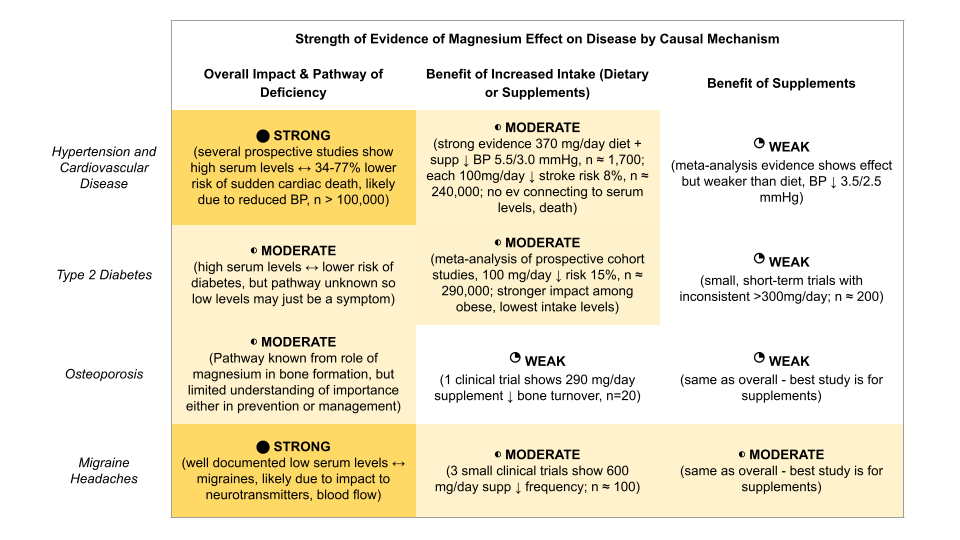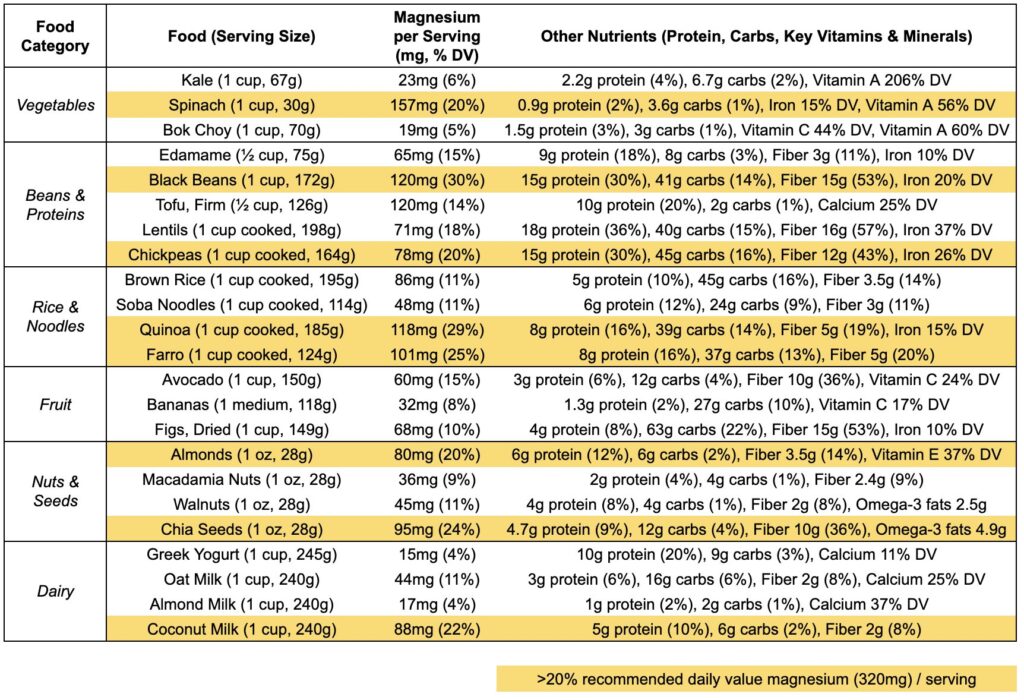
Since the days of Dr. Oz, a popular internet heuristic for clocking quack doctors has been “are they shilling supplements?” It’s easy to disparage: a cheap-to-produce, relatively unregulated, poorly understood product that lets the seller elude to potential health benefits without obligation to prove results. At the same time, supplements have flooded the mainstream, lionized by tech moguls and backed by VCs. With some sizing the global market at $330B in the next decade, clearly many others have suspended their skepticism. It seemed time to update my mental model. Were there any supplements that actually worked? So began my deep dive into magnesium
What does magnesium do?
Magnesium is a mineral involved in catalyzing many biochemical processes in the human body (an enzyme “cofactor” 🤓). At higher dosages (1200mg), it has traditional medical function as the active ingredient in laxatives, but SEO–oriented academic medical centers and supplement distributors (typically at a 500mg dosage) alike draw connection to its biochemical role in health blood pressure, insulin, and bone strength to suggest magnesium deficiency could explain poor sleep, loss of appetite, muscle pain, depression, anxiety, and nausea.

Are supplements necessary?
While the average American would likely benefit from higher magnesium levels, the evidence the evidence for some of the stronger claims made by supplement companies is weak, according to the National Institute of Health. National surveys from the early 2000s and my anecdotal observations observed that daily intake from the average American diet is below the recommended amount (420mg recommended vs. 268mg average for men and 320mg vs 234mg average for women), but because magnesium is both naturally occuring in the body and difficult to measure, studies connecting health outcomes to observed magnesium levels are limited.
Have supplements been demonstrated in clinical research?
While having more magnesium would be better for the average American, there’s limited evidence demonstrating that supplements are the right modality and dosage to get the benefit medical researchers are talking about. The table below summarizes the research with attention to differences in study type, demonstrated causal relation, and sample size.
Summary of Magensium Research by Disease

Source: National Institutes of Health
Although magnesium is good and important, generally studies:
- Show associations between magnesium deficiency and chronic conditions (poor health outcomes)
- Are more robust in
- Heart disease, where we understand how magnesium helps regulate blood flow and there’s evidence of (small) effects of increased intake on key outcomes (stroke) and the expected mechanism (blood pressure)
- Type 2 diabetes, where there is ample evidence of the correlation between low magnesium levels and diabetes risk, although evidence around the pathway and magnesium intake as an intervention is weaker
- Have NOT rigorously demonstrated the efficicacy of supplements alone in prevention or reversal
What are your options?
How do magnesium supplements compare to dietary changes?
How much magensium can I get from food (realistically)? Although we’re low on magnesium “on average” a quick review of magnesium levels in common foods shows it wouldn’t be too hard to achieve the recommended daily value with some intention. I could hit the 320mg / day recommended for adult women pretty comfortably with some modest modifications to my current diet: adding quinoa and hummus to my usual kale salad, having a chia seed and coconut milk pudding for dessert, and snacking on a handful of almonds throughout the day.
High Magnesium Foods by Serving Size

Source: ChatGPT 🙂
What is the difference between the different types of magnesium supplements?
Magnesium citrate. Magnesium glycinate. Oxide. L-Threonate. There are tons of magnesium compounds on the market. It can seem overwhelming but they’re simply defined by the molecule attached to the magnesium (you may recall from high school chemistry that Magnesium, Mg2+, is a positive ion and needs to be neutralized by attached to negative anion to form a stable salt compound). The stabilizing compound affects how it will be absorbed by the body (bioavailability), theoretically impacting when and how you should take it, as well as side effects. Again, the evidence is weak here, but if you were micro-optimizing or get started with a “best bet”
- Overall magnesium deficiency: Magnesium Glycinate (oral, gentle on digestion) or Magnesium Citrate (oral, laxative effects).
- Brain health and cognition: Magnesium L-Threonate (oral, crosses blood-brain barrier).
- Muscle pain / relaxation and energy support: Magnesium Malate (oral, supports energy production), Magnesium Chloride (topical, skin absorption) or Magnesium Sulfate (topical, bath use).
- Heart health and blood pressure: Magnesium Taurate (oral, cardiovascular support).
- Stomach (gastrointestinal) issues: Magnesium Citrate (oral, mild laxative), Magnesium Oxide (oral, strong laxative, low absorption), Magnesium Oxide (oral, antacid for indigestion and heartburn).
So what should I do?
Altogether, there’s limited downside of taking magnesium, but the upside is either low likelihood or low impact. Since magnesium is relatively cheap, I’d say there’s a slight edge to doing vs not, but definitely not at the expense of better-established interventions.
For healthy people looking to optimize their health quality of life (sleep, stress, mental health) try it if you can’t improve magnesium intake and observe results with focused dietary improvements (like supplements, little downside and even more upside).
For people managing the Four Horsemen*, it would be dangerous to forego highly effective treatments – even if costlier and with some side effects – in the hopes supplements work out.
For healthy people looking to prevent or manage risk of the Four Horsemen (which should be the rest of us!), the attention you want to put here is really a function of your individual risk exposure and appetite. I hope the studies summarized here empower you to ask your doctor thoughtful questions and compose a deliberate plan. For me personally, I first think in terms of my health priorities, then compare expected impact for my condition area to effort of changes.
- I’m willing to make bigger commitments and experiment more to manage my risk of heart disease due to my heightened risk factors (family history + disgusting salt addiction that is going to give me hypertension), even if the magnitude of effect is small
- My ultimate goal with increased magnesium intake is avoiding a heart attack (acute myocardial infarction) or stroke (ischemic heart disease), but from a traceable process perspective I’d like to see reduced blood pressure
- The best evidence says I will see the most results here by combining magnesium supplements with dietary changes, so I’ll commit to both: ensuring I receive the recommended daily value through diet and taking a supplement as needed and convenient)
- Because the outcome I’m targeting has stronger evidence for the benefits of dietary intervention, I may stop taking supplements if I don’t feel positive quality of life benefits (compared to if I were worried about osteoporosis, for example)
- Because the mechanistic evidence is weak overall, I’m not going to invest much time in understanding my baseline serum or intake levels
* Dr. Peter Attia’s useful term for the four lifestyle-related conditions most likely to reduce the longevity of someone living a modern Western lifestyle: metabolic syndrome (diabetes, obesity), dementia, cardiovascular disease, and cancer.
For me, the lesson of magnesium is there are nutrients with promising clinical value. We’re right to stay skeptical, but there’s enough out there for me to be willing to experiment. In my book at least, I won’t discredit a doctor willing to consider the value of nutritional enrichment, even throught supplements, as a self-serving “woo.” Bright neon maxxx performance enhancing become an Olympian with my pill claims from consumer retail executives, however, can find look for another delulu girl to target.
What do you think? Are you sold on magnesium? Would love to hear your thoughts and how your thoughts about the credibility of supplements have changed over the years!
Leave a Reply